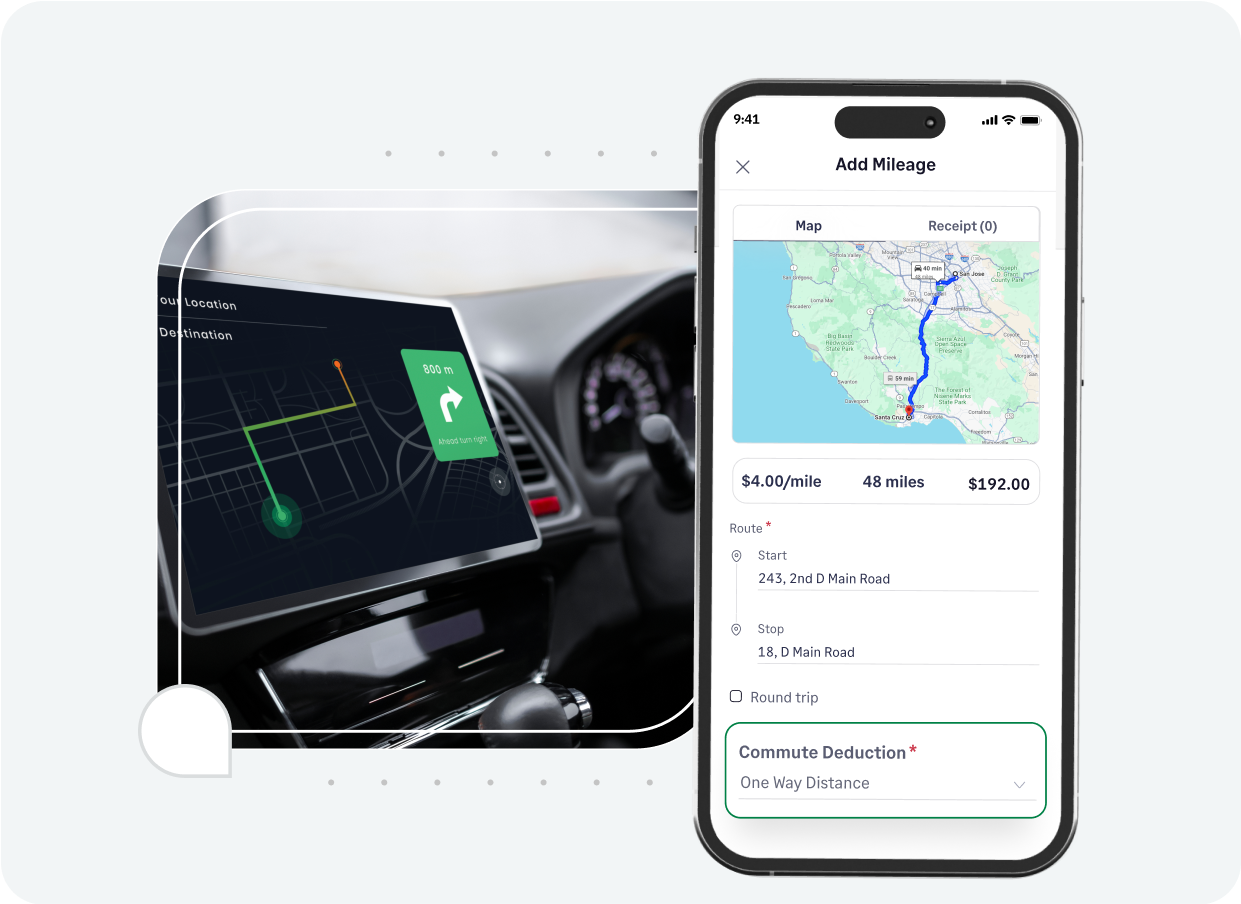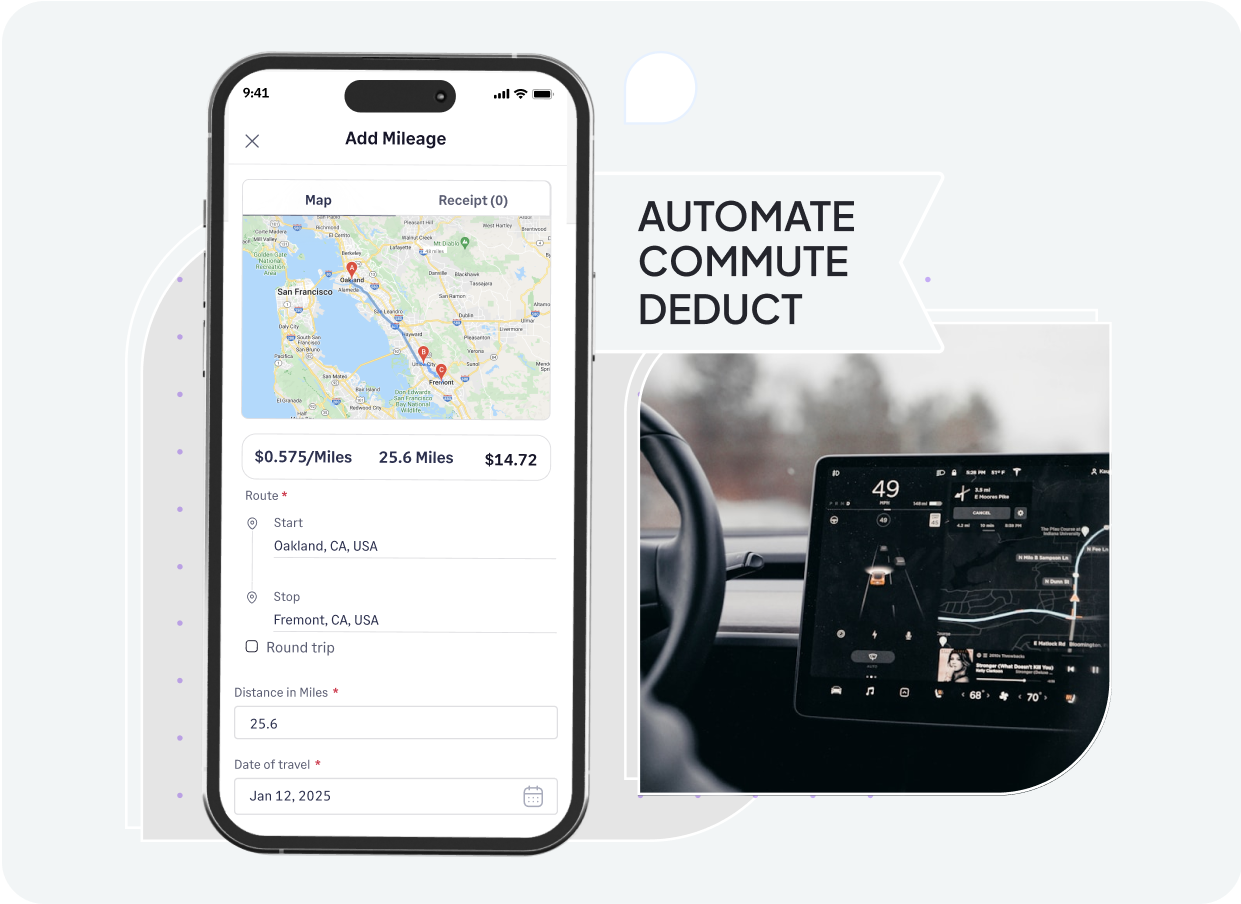In Iowa, understanding mileage reimbursement involves looking at federal guidelines, state-specific rules for certain situations, and the general practices adopted by employers. For businesses and employees in Iowa, knowing these rates and rules is key to fair compensation and compliance.
The most frequently referenced standard for business mileage reimbursement is the rate set by the Internal Revenue Service (IRS). For the year 2025, the IRS has announced the standard mileage rate for business use at 70 cents per mile. This rate was 67 cents per mile for 2024.
While Iowa private employers are not generally mandated by a specific state law to use the IRS rate for all business mileage, many choose to do so because:
- It offers a clear, widely accepted benchmark.
- Reimbursements under an accountable plan at or below this rate are typically non-taxable for employees and deductible for employers.
As of January 1, 2025, the key IRS standard mileage rates are:
- 70 cents per mile for business use of a vehicle.
- 21 cents per mile for medical or moving purposes (note: the deduction for moving expenses is currently limited to active-duty members of the U.S. Armed Forces).
- 14 cents per mile driven in service of charitable organizations.
For historical context, here are the IRS standard business mileage rates from recent years:
Iowa Mileage Reimbursement Calculator
Simplify your mileage reimbursement calculations with our user-friendly Iowa Mileage Reimbursement Calculator.
How to Use the Calculator:
- Select the correct tax year: Choose the year for which you're calculating reimbursement (e.g., 2025, 2024), as the applicable IRS rates can change.
- Input your business miles: Enter the total number of miles driven for business purposes using your personal vehicle.
- Calculate your reimbursement: The calculator will automatically apply the official IRS standard mileage rate for the selected year and display your estimated reimbursement amount.
This tool provides a quick and accurate estimate, beneficial for both employees needing to claim expenses and employers processing those claims.
Calculate
Results
Some Important Iowa Mileage Reimbursement Laws
While Iowa doesn't have a single law mandating mileage reimbursement for all private-sector employees in every instance, several state laws and federal regulations influence how employers should handle these expenses:
1. Iowa Minimum Wage Law (Chapter 91D)
Iowa's minimum wage is $7.25 per hour. This is the same as the current federal minimum wage. Crucially, any unreimbursed business expenses required of an employee, such as mileage for using a personal vehicle for work, should not cause their effective hourly earnings to fall below this minimum wage for the hours worked in a pay period.
If it does, the employer could be in violation of both Iowa and federal wage laws.
2. Iowa Wage Payment Law (Chapter 91A)
This law governs how employers must pay wages. It stipulates that employers cannot withhold any part of an employee's wages unless specific legal conditions are met or if the employee has provided written authorization for a deduction that benefits them.
Furthermore, it requires that if an employer authorizes an expense, any claim for reimbursement from the worker must be paid within 30 days. While this doesn't force employers to authorize mileage as an expense, if they do, timely reimbursement is required.
3. No General Mandate for Private Employers
Outside the context of ensuring minimum wage compliance and reimbursing "authorized" expenses, there isn't a broad Iowa statute compelling private employers to reimburse for mileage at a specific rate or in all situations where a personal vehicle is used for work.
Company policy, therefore, plays a significant role.
4. Workers' Compensation (Iowa Code §85.39)
As mentioned, Iowa law does require reimbursement for actual travel expenses, including mileage at a rate set by the Workers' Compensation Commissioner (currently 56 cents per mile as of July 2023), for injured employees to attend medical appointments related to their work injury.
Iowa Mileage Reimbursement Law vs. Federal Law
Understanding the interplay between Iowa's state laws and federal laws is essential for proper mileage reimbursement:
Federal Law (FLSA)
The Fair Labor Standards Act (FLSA) is the primary federal law affecting this area. It mandates that employees receive at least the federal minimum wage ($7.25 per hour) "free and clear" of any business expenses incurred primarily for the employer's benefit.
If an Iowa employee's unreimbursed mileage costs effectively reduce their pay below this federal threshold, the employer must provide sufficient reimbursement to meet the minimum wage.
Iowa State Law
- Iowa's minimum wage law (Chapter 91D) mirrors the federal rate of $7.25 per hour. Thus, compliance with this is important.
- The Iowa Wage Payment Law (Chapter 91A) adds a requirement for timely payment (within 30 days) of expenses that the employer has authorized for reimbursement.
- Specific provisions exist for mileage reimbursement under workers' compensation.
IRS Regulations
The IRS sets the standard mileage rates (e.g., 70 cents/mile for business in 2025) for tax purposes. These rates are not legal mandates for employers to reimburse but are crucial for determining the non-taxable amount of reimbursement under an accountable plan.
Using these rates helps ensure that reimbursements aren't considered taxable income for employees and are deductible for employers.
In Iowa, both state and federal minimum wage laws provide a wage floor. State law also ensures timely payment of authorized expenses. IRS guidelines then offer a practical framework for the amount and tax treatment of reimbursements, widely adopted by Iowa employers.
How Sage Expense Management (formerly Fyle) Can Automate Mileage Tracking
For Iowa businesses still relying on manual mileage logs and paper-based expense reports, the process can be fraught with inefficiencies and inaccuracies. Sage Expense Management presents a streamlined, automated solution to manage mileage tracking and reimbursement effectively.
Here’s how we help Iowa businesses stay on top of mileage expenses:
- Accurate, automated mileage logging: Powered by Google Maps, we accurately calculates mileage when employees input their start, stop (if any), and destination points. This eliminates manual odometer tracking and ensures precise data for every trip.
- Flexible rate management: Whether your company aligns with the annual IRS standard rates, uses Iowa's state employee rate for specific contexts, or has established its own custom rates for different vehicle types, our system allows finance teams to easily configure and automatically apply these rates.
- Clear commute management: We simplify the often-tricky task of deducting non-reimbursable commute miles. By defining home and work locations, businesses can ensure accurate, IRS-compliant calculations and deductions for commute travel.
- One-click recurring trips: For employees in Iowa who make the same business trips regularly, we allow the setup of recurring mileage claims. This saves significant time and reduces the monotony of manual entry for frequent routes.
- Embedded policy adherence: Integrate your company’s specific mileage reimbursement policies directly. Create rules for distance limits, maximum claim values, or required documentation. Fyle automatically checks submissions against these policies, promoting compliance before reports even get to approvers.
- Effortless accounting integration: Sage Expense Management syncs seamlessly with major accounting software like QuickBooks, Xero, NetSuite, and more. This direct flow of approved mileage data eradicates manual data entry, reduces the chance of errors, and frees up your finance team for more strategic work.
- Prompt employee reimbursements via ACH: We support direct ACH payments for employee reimbursements (US only), ensuring that Iowa employees receive their approved mileage expenses quickly and efficiently, closing the loop on the entire process.
By leveraging Sage Expense Management, businesses across Iowa can transform their mileage tracking from a manual chore into an automated, compliant, and efficient operation.


































